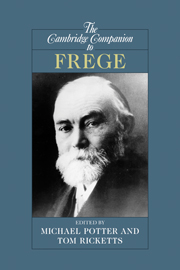Book contents
- Frontmatter
- 1 Introduction
- 2 Understanding Frege’s project
- 3 Frege’s conception of logic
- 4 Dummett’s Frege
- 5 What is a predicate?
- 6 Concepts, objects and the Context Principle
- 7 Sense and reference: the origins and development of the distinction
- 8 On sense and reference: a critical reception
- 9 Frege and semantics
- 10 Frege’s mathematical setting
- 11 Frege and Hilbert
- 12 Frege’s folly: bearerless names and Basic Law V
- 13 Frege and Russell
- 14 Inheriting from Frege: the work of reception, as Wittgenstein did it
- Bibliography
- Index
- Series List
1 - Introduction
Published online by Cambridge University Press: 28 September 2010
- Frontmatter
- 1 Introduction
- 2 Understanding Frege’s project
- 3 Frege’s conception of logic
- 4 Dummett’s Frege
- 5 What is a predicate?
- 6 Concepts, objects and the Context Principle
- 7 Sense and reference: the origins and development of the distinction
- 8 On sense and reference: a critical reception
- 9 Frege and semantics
- 10 Frege’s mathematical setting
- 11 Frege and Hilbert
- 12 Frege’s folly: bearerless names and Basic Law V
- 13 Frege and Russell
- 14 Inheriting from Frege: the work of reception, as Wittgenstein did it
- Bibliography
- Index
- Series List
Summary
EARLY LIFE
Frege was born in 1848 in Wismar, a small port on the Baltic coast in Mecklenberg. His father, who ran a private school for girls there, died when he was eighteen, and his mother took over the running of the school in order to be able to provide for the university education of Frege and his younger brother. Frege was encouraged in this by a young teacher at his father's school called Leo Sachse. Sachse had attended university in Jena, and Frege went there too in 1869, lodging in the same room that Sachse had rented there before him. Frege's studies in Jena consisted mainly of courses in mathematics and chemistry. The only philosophy was a course on Kant's critical philosophy given by Kuno Fischer. From Jena Frege went on to Göttingen, where he took further courses in mathematics and physics and wrote a dissertation, 'On a Geometrical Representation of Imaginary Forms in the Plane'. His only philosophy course at Göttingen was one on the philosophy of religion given by Hermann Lotze. After five semesters, Frege returned to Jena to submit a further dissertation for his venia docendi (i.e. licence to teach in the university).
From Jena Frege went on to Göttingen, where he took further courses in mathematics and physics and wrote a dissertation, ‘On a Geometrical Representation of Imaginary Forms in the Plane’. His only philosophy course at Göttingen was one on the philosophy of religion given by Hermann Lotze. After fi ve semesters, Frege returned to Jena to submit a further dissertation for his venia docendi (i.e. licence to teach in the university). The title of this second dissertation was ‘Methods of Calculation based on an Extension of the Concept of Quantity’. Neither dissertation exhibits more than a passing interest in logic or the philosophy of mathematics.
- Type
- Chapter
- Information
- The Cambridge Companion to Frege , pp. 1 - 31Publisher: Cambridge University PressPrint publication year: 2010
- 2
- Cited by



